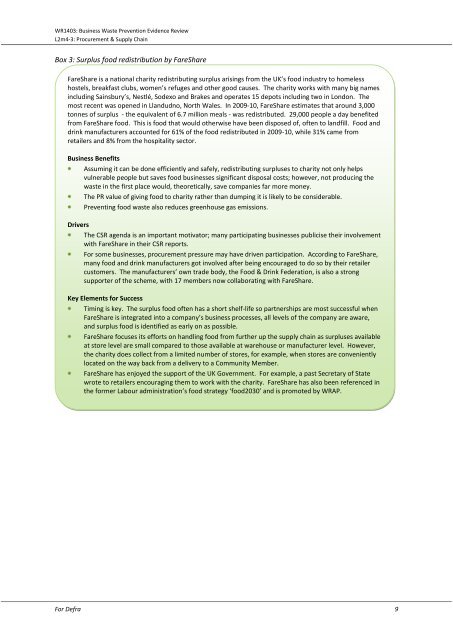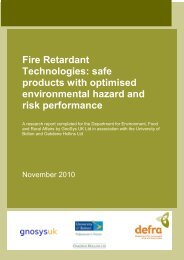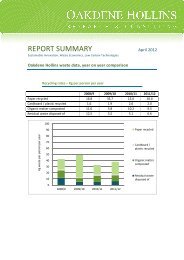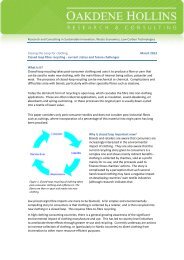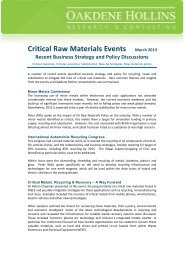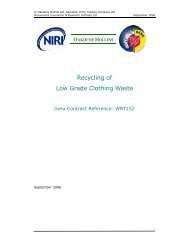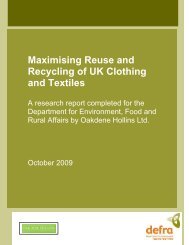Procurement and Supply Chain - Oakdene Hollins
Procurement and Supply Chain - Oakdene Hollins
Procurement and Supply Chain - Oakdene Hollins
You also want an ePaper? Increase the reach of your titles
YUMPU automatically turns print PDFs into web optimized ePapers that Google loves.
WR1403: Business Waste Prevention Evidence Review<br />
L2m4-3: <strong>Procurement</strong> & <strong>Supply</strong> <strong>Chain</strong><br />
Box 3: Surplus food redistribution by FareShare<br />
FareShare is a national charity redistributing surplus arisings from the UK’s food industry to homeless<br />
hostels, breakfast clubs, women’s refuges <strong>and</strong> other good causes. The charity works with many big names<br />
including Sainsbury’s, Nestlé, Sodexo <strong>and</strong> Brakes <strong>and</strong> operates 15 depots including two in London. The<br />
most recent was opened in Ll<strong>and</strong>udno, North Wales. In 2009-10, FareShare estimates that around 3,000<br />
tonnes of surplus - the equivalent of 6.7 million meals - was redistributed. 29,000 people a day benefited<br />
from FareShare food. This is food that would otherwise have been disposed of, often to l<strong>and</strong>fill. Food <strong>and</strong><br />
drink manufacturers accounted for 61% of the food redistributed in 2009-10, while 31% came from<br />
retailers <strong>and</strong> 8% from the hospitality sector.<br />
Business Benefits<br />
Assuming it can be done efficiently <strong>and</strong> safely, redistributing surpluses to charity not only helps<br />
vulnerable people but saves food businesses significant disposal costs; however, not producing the<br />
waste in the first place would, theoretically, save companies far more money.<br />
The PR value of giving food to charity rather than dumping it is likely to be considerable.<br />
Preventing food waste also reduces greenhouse gas emissions.<br />
Drivers<br />
The CSR agenda is an important motivator; many participating businesses publicise their involvement<br />
with FareShare in their CSR reports.<br />
For some businesses, procurement pressure may have driven participation. According to FareShare,<br />
many food <strong>and</strong> drink manufacturers got involved after being encouraged to do so by their retailer<br />
customers. The manufacturers’ own trade body, the Food & Drink Federation, is also a strong<br />
supporter of the scheme, with 17 members now collaborating with FareShare.<br />
Key Elements for Success<br />
Timing is key. The surplus food often has a short shelf-life so partnerships are most successful when<br />
FareShare is integrated into a company’s business processes, all levels of the company are aware,<br />
<strong>and</strong> surplus food is identified as early on as possible.<br />
FareShare focuses its efforts on h<strong>and</strong>ling food from further up the supply chain as surpluses available<br />
at store level are small compared to those available at warehouse or manufacturer level. However,<br />
the charity does collect from a limited number of stores, for example, when stores are conveniently<br />
located on the way back from a delivery to a Community Member.<br />
FareShare has enjoyed the support of the UK Government. For example, a past Secretary of State<br />
wrote to retailers encouraging them to work with the charity. FareShare has also been referenced in<br />
the former Labour administration’s food strategy ‘food2030’ <strong>and</strong> is promoted by WRAP.<br />
For Defra 9


